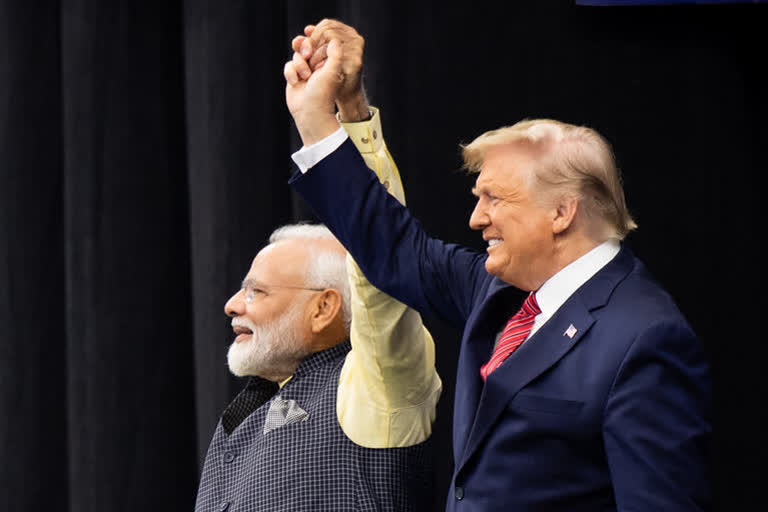New Delhi: Even as India and China are involved in a border tussle in eastern Ladakh and Beijing is pushing its expansionist policies in the South China Sea region, a senior US diplomat has said that India will remain the centrepiece of Washington's Indo-Pacific strategy.
Speaking at a week-long discussion themed "US-India: Navigating New Challenges" currently underway and organised by the US-India Strategic Partnership Forum (USISPF), US Deputy Secretary of State Stephen Biegun said that Washington's new Indo-Pacific strategy reflects the realities of the modern world, and the Indo-Pacific strategy is focused around democracies.
"It's focused around free markets," Biegun said on Monday.
"It's focused upon the values that the Indian government and the Indian people share with the United States government and the United States people. In order to make that successful we have to tap into the full scale of the region. That includes the scale of economics, the scale of security cooperation, and that's impossible to do without India as a centerpiece of the strategy. So as important as I'd like to think the United States is to this strategy, it's not going to be successful for us without India also standing side by side."
The Indo-Pacific region, first mooted by Shinzo Abe during his first term as Japanese Prime Minister in 2006-07, stretches from the east coast of Japan to the east coast of Africa.
Read: India trusted Abe's leadership for Japan's role in NE devpt, says ex-diplomat
Biegun's comments came in the wake of a bloody conflict between Indian and Chinese troops in Ladakh in June this year that led to deaths on both sides for the first time along the Line of Actual Control (LAC) in 45 years.
Meanwhile, last month, the US also imposed visa restrictions and sanctions on Chinese individuals and enterprises for Beijing's hegemonistic approach in the South China Sea region.
In July, the Chinese People's Liberation Army (PLA) Navy started naval exercises in the South China Sea through amphibious assault activities.
To counter China's latest activities near the Paracel islands, the US deployed three nuclear-powered aircraft carriers to the South China Sea.
China is locked in disputes over the Spratly and Paracel groups of islands in the South China Sea with other countries of the region.
While the other claimants over the Spratly islands are Brunei, Malaysia, the Philippines, Taiwan and Vietnam, the Paracel islands are also claimed by Vietnam and Taiwan.
Read: US slaps sanctions on Chinese nationals, firms over South China Sea militarisation
In 2016, the Hague-based Permanent Court of Arbitration ruled that China violated the Philippines' rights in the South China Sea, one of the busiest commercial shipping routes in the world.
The court accused China of interfering with the Philippines' fishing and petroleum exploration, building artificial islands in the waters and failing to prevent Chinese fishermen from fishing in the zone.
Then again, in July, Vietnam and the Philippines raised concerns over China’s repeated violations of maritime laws in the South China Sea.
Apart from this, Beijing is also involved in a dispute with Tokyo over the Senkaku Islands – called Diayou Islands by China – in the East China Sea.
Biegun said that "India has shown tremendous leadership and interest in contributing in its own right to the Indo-Pacific strategy we're advancing."
Read: Sri Lanka always dependent on India for external security: Expert
"India and the United States have deepened our security cooperation. We've - we're in the process of seeking an even broader economic relationship and through - including through some dimensions of trade liberalisation," he stated.
"And we're also working very closely in the security sphere, most recently India clearly indicating an intention to invite Australia to participate in the Malabar naval exercises, which will be a tremendous step forward in ensuring the freedom of passage and the security of the seas in the Indo-Pacific."
India, along with the US, Australia and Japan, is part of a Quadrilateral Security Dialogue, also known as the Quad, an informal strategic forum that is maintained by semi-regular summits, information exchanges and military drills between member countries.
The forum seeks to ensure peace, prosperity and open sea lines in the Indo-Pacific in the face of China's growing footprint in the region. The dialogue was paralleled by joint military exercises of an unprecedented scale, titled Exercise Malabar. The diplomatic and military arrangement was widely viewed as a response to increased Chinese economic and military power, and Beijing responded to the quad by issuing formal diplomatic protests to its members.
Read: A Biden White House unlikely to roll back US policies on India, China: Experts
Biegun's statement that India is the centrepiece of the US' Indo-Pacific strategy comes in the face of Prime Minister Narendra Modi's statement in the 2018 Shangri-La Dialogue in Singapore that the 10-nation Association of Southeast Asian Nations (ASEAN) regional bloc will be central to the future of the Indo-Pacific.
"It is not merely India, but many other countries hold ASEAN's centrality in the Indo-Pacific which means that the region's problems should be addressed through ASEAN-led institutions," Rajiv Bhatia, Distinguished Fellow at the Gateway House think tank and who served as India’s Ambassador to Myanmar, told ETV Bharat.
"But, on the other hand, when an American official says that India is the centrepiece of the US' Indo-Pacific strategy, it means that India is highly important to Washington's policy in the region in terms of dealing with China," Bhatia, who regularly comments on Indo-Pacific affairs, explained.
Read: India looking to blunt China's sharp power expansion policy


